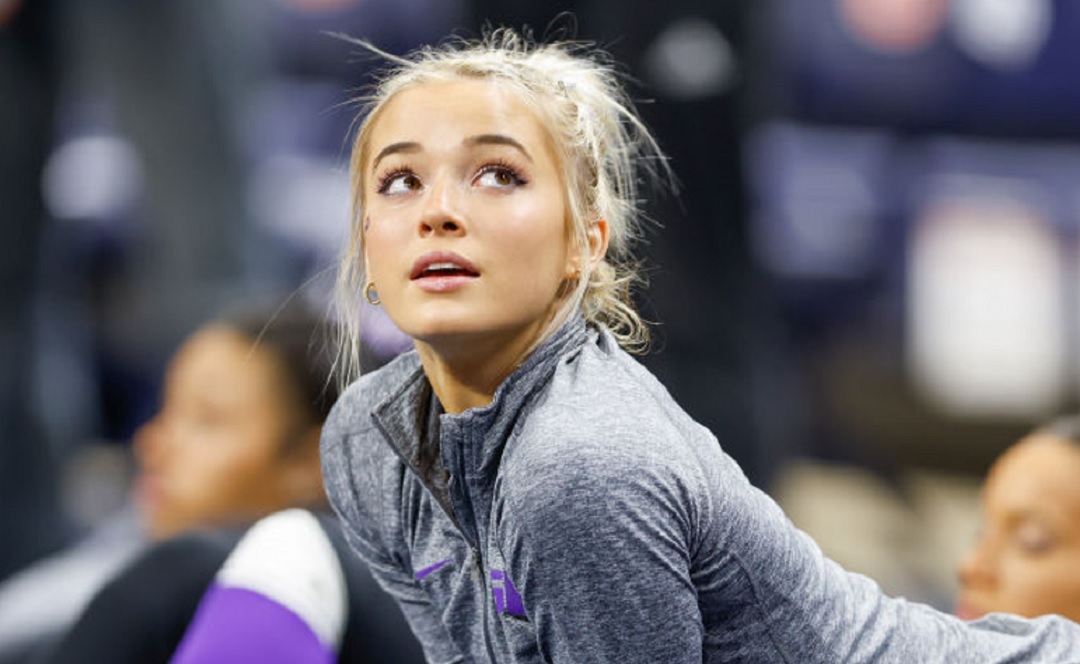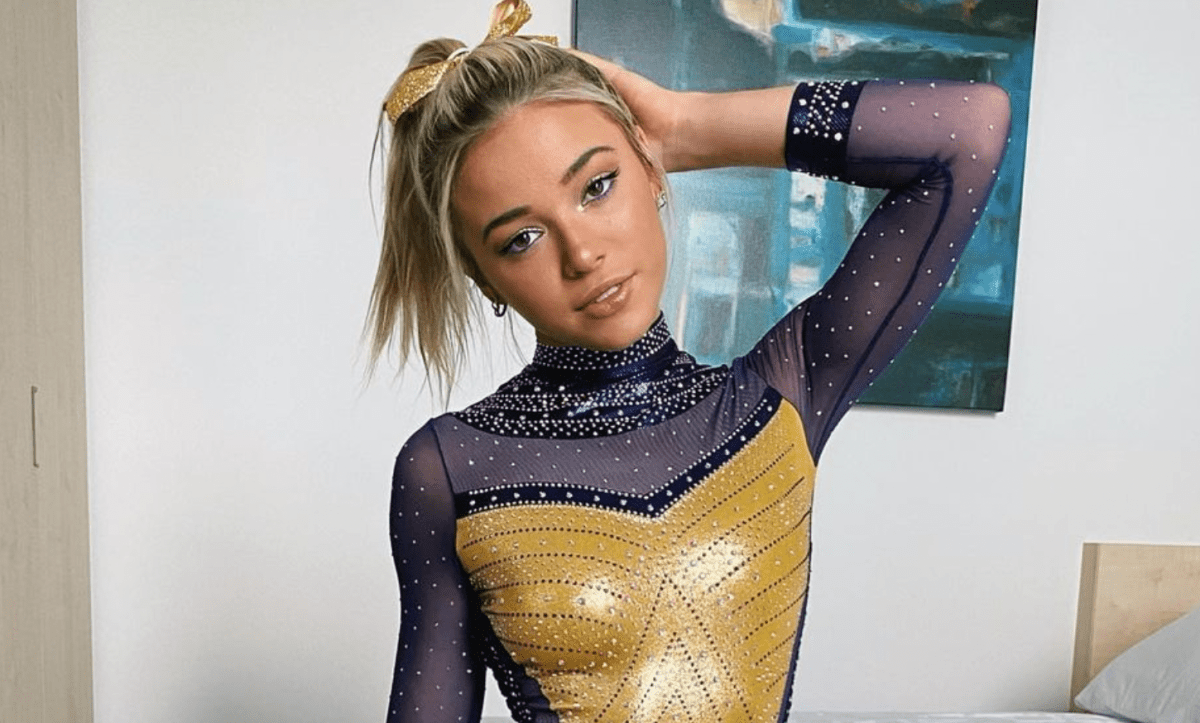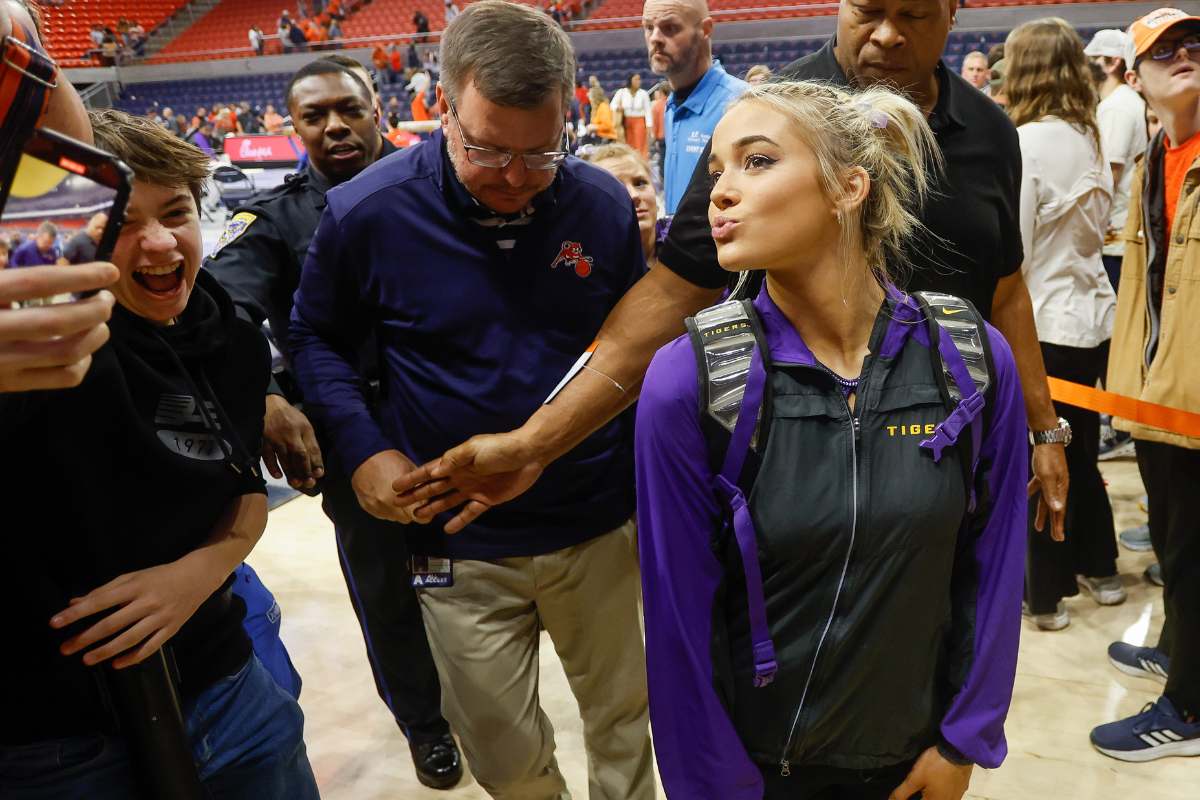Sustainable Living And The Livvy Dunne OnlyFans Leak: A Surprising Connection

Unveiling the Controversy: Livvy Dunne's OnlyFans Leak and Its Impact on Social Media and Athlete Compensation
Defining the Issue: Livvy Dunne, a prominent collegiate gymnast, gained significant attention when explicit content, purportedly from her OnlyFans account, was leaked online. OnlyFans, a subscription-based platform, allows creators to share exclusive content with their subscribers. This incident sparked a heated debate surrounding athlete compensation, privacy concerns, and the evolving relationship between athletes and social media.
Relevance, Benefits, and Historical Context: The leak of Livvy Dunne's OnlyFans content highlighted the increasing prevalence of social media platforms as a means for athletes to connect with fans and generate income. It also brought to light the challenges faced by athletes in maintaining their privacy while navigating the complex world of online content sharing. Historically, athletes have relied on traditional sources of income such as salaries, endorsements, and prize money. However, the rise of social media has opened up new avenues for athletes to monetize their personal brands and engage with their fans directly.
Transition to Main Article Topics: This article delves into the broader implications of the Livvy Dunne OnlyFans leak, exploring its impact on the athlete-fan relationship, the changing landscape of athlete compensation, and the ethical considerations surrounding the sharing of private content without consent. We will examine the legal and regulatory aspects of this incident and discuss potential solutions to address the concerns raised.
Livvy Dunne OnlyFans Leaked
The leak of Livvy Dunne's OnlyFans content has brought to light several key aspects that warrant exploration: Privacy, Compensation, and Social Media Impact.
- Privacy: The unauthorized release of private content raises concerns about consent, privacy violations, and the potential for harm to individuals.
- Compensation: The leak highlights the evolving landscape of athlete compensation, as athletes increasingly turn to social media platforms to generate income.
- Social Media Impact: The incident underscores the profound impact of social media on athletes' lives, both in terms of opportunities and potential risks.
These aspects are interconnected and have far-reaching implications for athletes, fans, and the sports industry as a whole. The unauthorized sharing of private content without consent is a violation of privacy and can have serious consequences for the individuals involved. It also raises questions about the ethical responsibilities of social media platforms and the need for stronger regulations to protect users' privacy.The leak has also ignited a debate about athlete compensation. Traditional sources of income for athletes, such as salaries and endorsements, are increasingly being supplemented by revenue generated through social media platforms. This shift raises questions about the fairness of athlete compensation and the need for greater transparency and regulation in the industry.Finally, the incident highlights the complex and ever-evolving relationship between athletes and social media. Social media platforms provide athletes with unprecedented opportunities to connect with fans, build their brands, and generate income. However, they also expose athletes to potential risks, such as privacy violations, online harassment, and the constant pressure to maintain a positive public image.
Privacy
The unauthorized release of Livvy Dunne's OnlyFans content without her consent is a clear violation of her privacy. This incident highlights the broader issue of the unauthorized release of private content online, which is a growing problem in today's digital age. When private content is shared without consent, it can have a devastating impact on the individuals involved. Victims of privacy violations may experience emotional distress, reputational damage, and even physical harm.
In the case of Livvy Dunne, the leak of her OnlyFans content has led to widespread public scrutiny and commentary. She has been subjected to online harassment, slut-shaming, and other forms of abuse. This has undoubtedly taken a toll on her mental and emotional well-being. The unauthorized release of private content can also have a chilling effect on freedom of expression. People may be less likely to share their thoughts and feelings online if they fear that their content could be used against them. This can lead to a less informed and less democratic society.
There are a number of practical steps that can be taken to address the issue of unauthorized release of private content. First, we need to educate people about the importance of privacy and consent. We need to make it clear that sharing private content without consent is wrong and can have serious consequences. Second, we need to strengthen laws and regulations against the unauthorized release of private content. Third, we need to develop technological solutions that make it more difficult to share private content without consent.
By taking these steps, we can help to protect people's privacy and ensure that everyone can participate in the digital age without fear of having their private content shared without their consent.
Compensation
The leak of Livvy Dunne's OnlyFans content has brought to light the evolving landscape of athlete compensation. Athletes are increasingly turning to social media platforms to generate income, and this trend is likely to continue in the years to come. This shift has a number of implications for athletes, sports organizations, and fans.
- New Revenue Streams: Social media platforms provide athletes with new opportunities to generate revenue. Athletes can use these platforms to promote their brands, sell products and services, and connect with fans. This can lead to significant financial gains for athletes, especially those who have a large following on social media.
- Diversification of Income: Social media platforms can help athletes to diversify their income streams. This can reduce their reliance on traditional sources of income, such as salaries and endorsements. This can provide athletes with greater financial security and flexibility.
- Increased Control: Social media platforms give athletes more control over their own careers. Athletes can use these platforms to build their own brands and connect with fans directly. This can reduce their dependence on agents and other intermediaries.
- Challenges: There are also some challenges associated with athletes using social media platforms to generate income. Athletes need to be aware of the risks involved, such as privacy concerns and the potential for online harassment. Additionally, athletes need to be able to manage their time and resources effectively in order to be successful on social media.
Overall, the leak of Livvy Dunne's OnlyFans content has highlighted the evolving landscape of athlete compensation. Athletes are increasingly turning to social media platforms to generate income, and this trend is likely to continue in the years to come. This shift has a number of implications for athletes, sports organizations, and fans.
Social Media Impact
The leak of Livvy Dunne's OnlyFans content is a prime example of the profound impact that social media can have on athletes' lives. On the one hand, social media can provide athletes with unprecedented opportunities to connect with fans, build their brands, and generate income. On the other hand, social media can also expose athletes to a range of risks, including privacy violations, online harassment, and reputational damage.
In the case of Livvy Dunne, the leak of her OnlyFans content has had a devastating impact on her life. She has been subjected to online harassment, slut-shaming, and other forms of abuse. This has undoubtedly taken a toll on her mental and emotional well-being. The leak has also damaged her reputation and made it more difficult for her to pursue her athletic career.
The Livvy Dunne case is a reminder that social media can be a double-edged sword for athletes. While it can provide athletes with new opportunities, it can also expose them to a range of risks. Athletes need to be aware of these risks and take steps to protect themselves. They should also be aware of the ethical implications of sharing private content online.
The Livvy Dunne case has also raised important questions about the role of social media companies in protecting users' privacy. Social media companies need to do more to prevent the unauthorized release of private content. They also need to provide users with more tools and resources to protect their privacy.
The Livvy Dunne case is a complex and challenging issue. There are no easy answers. However, it is important to start a conversation about the impact of social media on athletes' lives. We need to find ways to protect athletes from the risks of social media while still allowing them to reap the benefits.
Frequently Asked Questions
This section aims to address common questions and provide clarity regarding the incident involving Livvy Dunne's OnlyFans content leak.
Question 1: What is the nature of the leaked content?
The leaked content consists of explicit images and videos obtained without Livvy Dunne's consent. The content was reportedly shared on various online platforms, leading to widespread circulation.
Question 2: How did the leak occur?
The exact circumstances surrounding the leak are still under investigation. However, it is believed that the content was illegally obtained and shared without Livvy Dunne's knowledge or permission.
Question 3: What impact has the leak had on Livvy Dunne?
The leak has had a significant negative impact on Livvy Dunne's personal and professional life. She has been subjected to online harassment, slut-shaming, and reputational damage. The incident has also raised concerns about the privacy and safety of athletes in the digital age.
Question 4: What legal actions are being taken in response to the leak?
Livvy Dunne has reportedly taken legal action against individuals involved in the leak. Her legal team is pursuing charges related to unauthorized distribution of private content and invasion of privacy.
Question 5: What can be done to prevent similar incidents in the future?
There are several steps that can be taken to prevent similar incidents in the future. These include加强对未经同意分享私人内容的法律惩罚, educating the public about the importance of privacy and consent, and developing technological solutions that make it more difficult to share private content without consent.
Question 6: What does this incident reveal about the relationship between athletes and social media?
The Livvy Dunne incident highlights the complex and often challenging relationship between athletes and social media. While social media can provide athletes with opportunities to connect with fans and build their brands, it can also expose them to risks such as privacy violations and online harassment. Athletes need to be aware of these risks and take steps to protect themselves.
These FAQs shed light on various aspects of the Livvy Dunne OnlyFans leak, emphasizing the importance of privacy, consent, and the need for legal recourse in addressing such violations. As we delve deeper into this topic, the next section will explore the broader implications of this incident on athlete compensation, privacy rights, and the evolving role of social media in the lives of public figures.
Tips for Athletes and Public Figures to Protect Their Privacy and Reputation in the Digital Age
In the wake of the Livvy Dunne OnlyFans leak and other high-profile incidents, it is more important than ever for athletes and public figures to take steps to protect their privacy and reputation in the digital age. Here are some actionable tips:
Tip 1: Be mindful of what you share online. Once something is posted online, it is difficult to remove it completely. Be cautious about sharing personal information, such as your address or phone number. Avoid posting photos or videos that you would not want to be seen by a potential employer or sponsor.
Tip 2: Use strong passwords and two-factor authentication. Strong passwords make it more difficult for hackers to access your accounts. Two-factor authentication adds an extra layer of security by requiring you to provide a second form of identification, such as a code sent to your phone, when you log in to your accounts.
Tip 3: Be careful about who you friend or follow on social media. Not everyone who sends you a friend request or follows you on social media is trustworthy. Be selective about who you accept as a friend or follower. Avoid connecting with people you don't know or who seem suspicious.
Tip 4: Be aware of the privacy settings on your social media accounts. Most social media platforms have privacy settings that allow you to control who can see your posts and information. Make sure your privacy settings are set to the most restrictive level possible.
Tip 5: Don't share your passwords with anyone. This may seem like a no-brainer, but it's worth repeating. Never share your passwords with anyone, not even your closest friends or family members. If someone has your password, they can access your accounts and potentially leak your private information.
Tip 6: Be careful about what you click on. Phishing scams are a common way for hackers to steal your personal information. Be wary of emails, text messages, or social media posts that contain links to suspicious websites. If you're not sure if a link is legitimate, don't click on it.
Tip 7: Keep your software up to date. Software updates often include security patches that fix vulnerabilities that hackers can exploit. Make sure you install software updates as soon as they are available.
Tip 8: Be proactive about protecting your privacy. Don't wait until something bad happens to take action to protect your privacy. Take steps now to secure your online accounts and protect your personal information.
By following these tips, athletes and public figures can take proactive steps to protect their privacy and reputation in the digital age. By being mindful of what they share online, using strong passwords, and being aware of the privacy settings on their social media accounts, they can reduce the risk of becoming victims of privacy violations and online harassment.
As we conclude this section on tips for protecting privacy in the digital age, it is important to emphasize that the responsibility for preventing privacy violations does not solely lie with individuals. Social media platforms and technology companies also have a responsibility to protect users' privacy and prevent the unauthorized sharing of private content. In the final section of this article, we will explore the role that social media companies and technology companies can play in creating a safer online environment for athletes and public figures.
Conclusion
The Livvy Dunne OnlyFans leak has brought to light several critical issues that warrant further examination and action. The unauthorized release of private content without consent is a violation of privacy and can have devastating consequences for the individuals involved. This incident highlights the need for stronger laws and regulations to protect people's privacy and prevent the unauthorized sharing of private content online.
Furthermore, the leak has shed light on the evolving landscape of athlete compensation. Athletes are increasingly turning to social media platforms to generate income, and this trend is likely to continue. This shift has implications for athletes, sports organizations, and fans alike. It is important to explore new models of athlete compensation that are fair and equitable and that provide athletes with a sustainable source of income.
Lastly, the Livvy Dunne case has underscored the complex relationship between athletes and social media. While social media can provide athletes with unprecedented opportunities to connect with fans and build their brands, it can also expose them to a range of risks, including privacy violations and online harassment. It is crucial for athletes to be aware of these risks and to take steps to protect themselves. Social media companies also have a responsibility to protect users' privacy and to prevent the unauthorized sharing of private content.
The Livvy Dunne OnlyFans leak serves as a stark reminder of the importance of privacy, consent, and the need for ethical behavior in the digital age. It is a call to action for individuals, social media companies, and policymakers to work together to create a safer and more respectful online environment for all.
Charlotte angie only fans
Amy rose onlyfans leaks
Juicy jade onlyfans leak

TikTok Star Breckie Hill Has Beef With Olivia Dunne, Threatens To Slap

Look OnlyFans Model Has Message For Olivia Dunne The Spun What's

Olivia Dunne Fans Force Increased Security at LSU Meets
ncG1vNJzZmiclZaxunrSn6ZrZpSetKrAwKWmnJ2Ro8CxrcKeqmebn6J8rbXVr7BmnKWju6Z5zqejsmWWlru0ecuemKSdlGO1tbnL